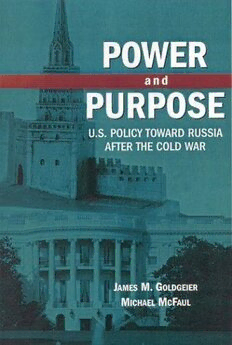
Power and Purpose: U.S. Policy Toward Russia After the Cold War PDF
480 Pages·2003·1.841 MB·English
Most books are stored in the elastic cloud where traffic is expensive. For this reason, we have a limit on daily download.
Preview Power and Purpose: U.S. Policy Toward Russia After the Cold War
Description:
This work traces the formulation and evolution of American foreign policy toward the Soviet Union and Russia during the tumultuous and uncertain decade following the end of the Cold War. It examines how American decision-makers - particularly in the executive branch - coped with opportunities and challenges presented by a new Russia. Based on extensive interviews with senior US and Russian officials, the book explains George H.W. Bush's response to the dramatic coup of August 1991 and the Soviet breakup several months later, examines Bill Clinton's efforts to assist Russia's transformation and integration, and analyses George W. Bush's policy toward Russia as September 11 and the war in Iraq transformed international politics. Throughout, the book focuses on trade-offs and linkages among America's interests in promoting democracy and markets in Russia, as well as its interests in reorienting Russia from security threat to security partner. Understanding how three US administrations dealt with these critical policy questions is vital for thinking about not only America's Russia policy but also efforts to help transform and integrate other former adversaries.
See more
The list of books you might like
Most books are stored in the elastic cloud where traffic is expensive. For this reason, we have a limit on daily download.
